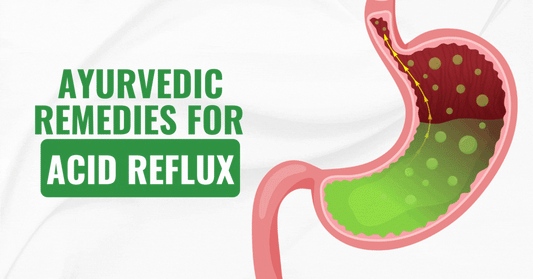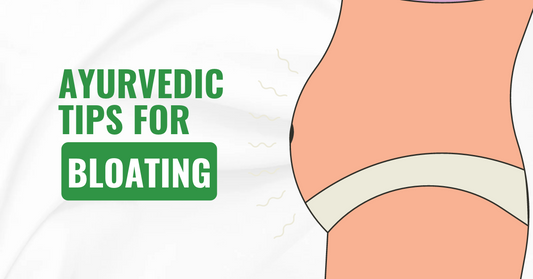What is a Balanced Diet according to Ayurveda?
Share
A balanced diet is a form of a meal that consists of all the nutrients that a human body needs for its basic activities. Many people have different types of bodies that have different forms of nutrition requirements. A proper dietician or a nutritionist can determine the type of diet chart a person needs after examining their body. A balanced diet will generate not only a healthy body but also a healthy mind. This kind of diet will fulfill all the nutrition requirements in the body. A deficiency of any nutrients will lead to the breakdown of the body systems and cause tiredness, fatigue, and disease development.
Types of tastes and their role in a balanced diet:
A balanced diet must contain a combination of the six tastes as it helps to keep the palette clean and help in proper digestion. These tastes are sweet, sour, salty, spicy, bitter, and astringent taste. These tastes have different properties that help in proper digestive functioning.
- Sweet: Sweet taste helps to strengthen the body, regulate healthy body fluids, and provide longevity. It helps to build tissues and calms nerves. Excess of this taste will give rise to weight gain, diabetes, and obesity. Sweet taste is available in syrups, pumpkin, rice, wheat, and desserts.
- Sour: Sour taste increases the awakening of thoughts and emotions and improves digestion procedure. This taste cleanses tissues and helps in the absorption of important minerals. Excessive sourness leads to aggression. Sour taste is available in lemon, pickles, vinegar, and tamarind.
- Salty: Salty taste is known to hydrate the body, improve the taste of the food, provide lubrication in the tissues and help in the digestion process. Saltiness helps in digestion procedures and cleanses tissues. Excess of this taste increases blood pressure. Salty taste is available in sea vegetables, salt, and black olives.
- Spicy: Spicy taste is known to cleanse tissues, stimulate digestion, improve metabolism and improve blood circulation. Excess of spicy taste might lead to digestion problems. This taste is available in chilies, garlic, ginger, onion, and hot pepper.
- Bitter: Bitter taste acts as a detoxifying agent as it removes the toxins from the body. The bitter taste is available in turmeric, herbal tea, and some green vegetables.
- Astringent: Astringent absorbs water, tightens tissues, and dries up fast. Excess of astringent taste leads to gas formation in people. This taste is available in unripe bananas, cranberries, and beans.
A balanced diet in Ayurvedic Philosophy:
A balanced diet must contain all the six tastes as mentioned above, along with the nutritious elements. These nutritional elements will provide the human body with strength and prevent tiredness, sickness, etc. Including all six tastes in a meal will balance the human body and build major dietary blocks of macronutrients. For example, sweet food consists of fats, proteins, carbohydrates, and water; bitter and astringent food consists of vitamins and minerals. This inclusion of all the tastes will ensure the regular supply of energy and nutrients in the body. A perfect balance of all six tastes will also fulfill the cravings and stop the person from indulging in excess food consumption and avoiding unnecessary food cravings.
Though it is very difficult to include all six tastes in a single meal, the nutritional value should remain unchanged. A single meal should contain half a plate of vegetables, one–fourth plate of whole-grain, one – fourth plate of protein (vegetarian or nonvegetarian) with some nutritional herbs. This proportion of food will fulfill all the requirements of the nutrients in the human body.
Necessary Food and Nutrients in a Balanced Diet:
A balanced diet must contain all the necessary macronutrients and micronutrients. Macronutrients are proteins, fats, and carbohydrates. Micronutrients include vitamins and minerals. Human bodies especially need to intake vitamins and minerals through food as they cannot make these micronutrients. People should eat foods that include a balanced proportion of all the macro and micronutrients.
Vitamins and minerals act as antioxidants in the body and prevent the formation of certain diseases like cancer and Alzheimer’s problem.
Vitamin A and C generally lower the risk of cancer. Further, vitamins A, C, and E reduce the risk of developing Alzheimer’s by 12%, 17%, and 24%, respectively. Selenium can reduce the chance of developing heart diseases by24%.
Calcium - Reduces the chance of death from heart disease. Consumption of proportionate vitamins and minerals will provide the human body with the strength to prevent diseases and help lead a healthy life.
Functions of the different Nutrients in the Human Body:
There are six major types of nutrients required in the body for its necessary functions. These six nutrients are vitamins, minerals, water, protein, fat, and carbohydrate.
- Vitamins - Boost immune system, strengthen bones and teeth, maintain healthy skin, support healthy blood, metabolize proteins and carbohydrates in the body and prevent cancers. Fruits, vegetables, and lean proteins contain vitamins.
- Minerals - Balance water level in the body, maintain healthy skin and hair, strengthen bones, help blood clotting, carry oxygen, and maintain blood pressure. Meats, dairy, seafood, nuts, egg yolks, and leguminous foods contain minerals.
- Drinking-Water -Flushes toxins out of the body, transports nutrients, lubricates, and hydrates the body. Natural water and fruit juices fulfill this function.
- Protein - Boosts the growth and development of muscles, bone, hair, and skin, generates antibodies and hormones, and adds energy to the body cells. Red meats, poultry, fish, eggs, dairy, soya, and nuts contain protein.
- Fats - Help in cell growth, blood clot, muscle movement, vitamin and mineral absorption, and immunity development. Coconut oil, nuts, salmon, and tuna contain fats.
- Carbohydrates - Support digestive function, provide energy, help in brain function, and boost immunity. Brown rice, pasta, bread, bakery goods, and barley contain carbohydrates.
Effects of the Vitamin and Mineral Deficiencies:
You should consume vitamins and minerals in optimum amounts. Too much or too little of these are proven harmful. Vitamin D deficiency can result from a lack of sufficient sun exposure. On the other hand, vitamin B12 deficiency is common among those who avoid consuming animal products. Iron deficiency is harmful to women as they menstruate. Calcium deficiency leads to weaker bone structure and teeth.
- Vitamin B deficiency, especially Vitamin B7, leads to the weakening of hair and nails. To get a sufficient amount of Vitamin B7, one must include egg yolks, meat, fish, dairy products, nuts, spinach, broccoli, cauliflower, yeast, sweet potato, whole grains, and bananas in their diet. 30mg of Vitamin B7 is enough for adults.
- Iron and Vitamin B deficiency results in ulcers and cracks in the corner of the mouth. People with such deficiencies must include poultry, meat, fish, leguminous food, eggs, dairy products, green and starchy vegetables, and nuts in their diet.
- Vitamin C deficiency leads to bleeding gums. A sufficient amount of fruit consumption, especially citrus fruits, can fulfill the requirement of vitamin C.
- Vitamin A deficiency causes poor night vision (night blindness) and white growth in the eyes. Vitamin A fulfillment can be fulfilled with meat, dairy, eggs, fish, and dark leafy vegetables.
- Deficiency in zinc, vitamin B3, vitamin B2, and vitamin B6 leads to dandruff and scaly patches in the scalp. To avoid this vitamin B3, B2, and B6 deficiency, people should consume whole grain, poultry, meat, fish, eggs, dairy products, leguminous food, green vegetables, starchy vegetables, and nuts. To avoid zinc deficiency, people should eat seafood, meat, leguminous food, dairy products, nuts, and whole grains.
- A common problem like hair loss results from deficiencies of iron, zinc, vitamin B3, and vitamin B7. Consuming meat, fish, legumes, dark leafy vegetables, nuts, seeds, and whole grains can help fulfill these nutritional requirements.
- Deficiency in vitamin A and C leads to the formation of red and white eruptions on the skin. Consumption of foods like meat, fish, dark leafy vegetables, yellow and orange-colored vegetables, and fruit will fulfill the requirements of vitamin A and C.
End Notes
A balanced diet must have the ingredients to fulfill these basic nutritional requirements. More than a large quantity of meals, it is essential to have a high-quality meal or a balanced diet that provides the human body with all the necessary nutrients. To lead a healthy life, one must consume all the necessary macro and micronutrients.



